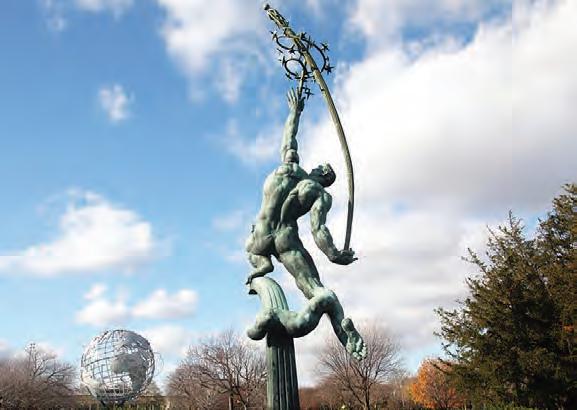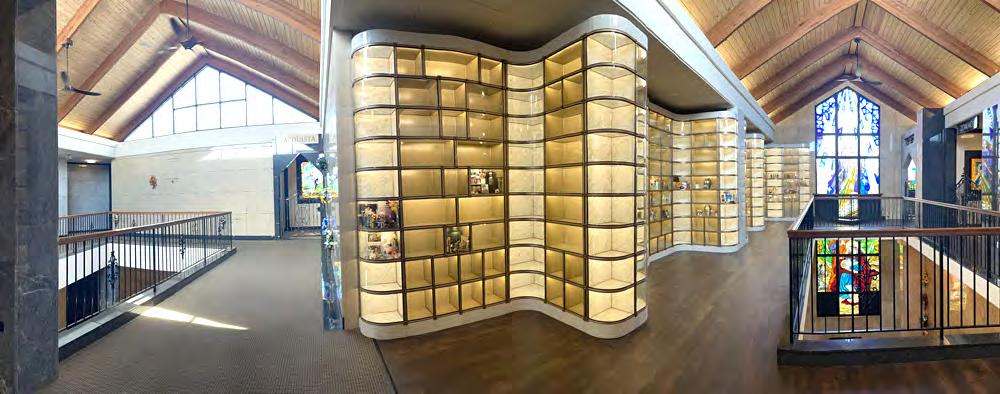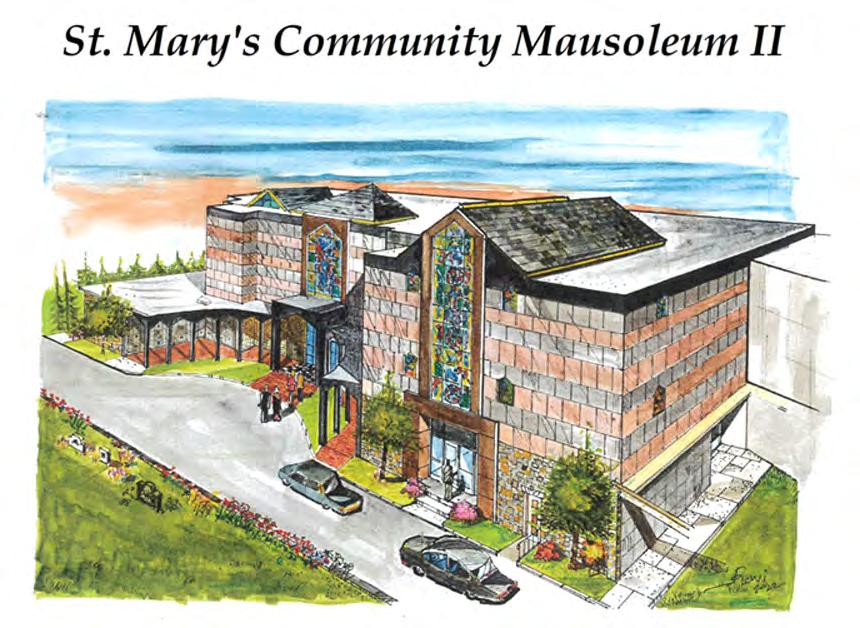
4 minute read
Some of the park’s relics are better known than others The many monuments of FMCP
by Sophie Krichevsky Associate Editor
Flushing Meadows Corona Park’s most famous monument is, without question, the Unisphere, to the extent that it has become practically synonymous with the park itself.
But Gilmore Clarke’s prized work is just one of a number of monuments throughout the park, each with a deep history of its own.
According to Jonathan Kuhn, director of arts and antiquities for the Department of Parks and Recreation, the vast majority of Flushing Meadows Corona Park’s 21 monuments are related to either the 1939 or 1964 World’s Fair, though more of them to the latter. While some of those works of art were meant to last only the duration of the fair, Kuhn said, others were commissioned with the intention that they would remain in the park permanently.
The latter includes Theodore Roszak’s “Forms in Transit,” Jose de Rivera’s “Free Form,” Marshall Fredericks’ “Freedom of the Human Spirit,” Donald De Lue’s “Rocket Thrower” and Paul Manship’s “Armillary Sphere.”
“Forms in Transit” depicts a rocket ship coming back to Earth, passing through the hot layers of the atmosphere. According to Kuhn, parts of the surface of the sculpture appear to be blistered so as to give the effect of soaring through the atmosphere. On the grounds of what is now the New York Hall of Science, “Forms in Transit” is in Rocket Park, known as Space Park at the time of the 1964 World’s Fair, where several rocket ships are still displayed.
Space exploration being en vogue at the time, and the nation embarking on President Kennedy’s mission to get to the moon, the final frontier was a key theme at the 1964 World’s Fair. Its works of art were no exception.
In addition to “Forms in Transit,” that also included “Rocket Thrower.” De Lue’s piece stands at a whopping 42.5 feet tall, and according to Kuhn, is the tallest sculpture in the city limits (he was sure to note that the Statue of Liberty, though taller, is in New York Harbor). The sculpture shows a larger-than-life figure who is — as the name would suggest — throwing a rocket into the sky. Its location in the park in the Court of Astronauts, with the Fountain of the Planets separating it from the Unisphere, again reinforces that space theme. According to Kuhn, the statue was restored in 2013 to see to some stability concerns, and the bronze surface is waxed every three to four years.
“Freedom of the Human Spirit” depicts male and female nude figures with wild swans soaring into the air. The 28-foot-tall sculpture was originally placed in what was called the Court of States, but Kuhn said it was moved as a result of the redesign of the United States Tennis Center in 1996. Now, it sits near the Unisphere.
“Free Form” is, by far, the most abstract of the five commissioned works. A stainless steel arc on a granite base, the sculpture — also known as “Form,” Kuhn said — contains a motor inside that allows it to slowly rotate. De Rivera was “a pretty significant modernist who was interested in sort of spatial relationships between sculpture and its environment,” Kuhn said. “There’s no one side that you look at that piece from that’s meant to be seen in the round — it’s almost like a gesture into the air.”
De Rivera also contributed to the 1939 World’s Fair with an installation of three rows of stainless steel flags; that did not stay at FMCP after the fair. around 2007, leaving his department to pick up the pieces — literally. “We were able to recover this piece of stone that was sheared off,” he explained. “We were able to sort of epoxy it back in and repaired it with mortar dust and rebuilt that section.”
Though Manship’s “Armillary Sphere” was intended to be at the park permanently, it did not remain that way: In the 1970s, eight of the spherical sculpture’s 12 pieces featuring the zodiac signs were stolen. The remaining pieces of the sculpture were stolen in 1980. While two of them were found in 1990, and Kuhn said another was later on, the remaining nine have never been recovered.
Many of the notable sculptures still in FMCP can be seen on seasonal tours led by the Alliance for Flushing Meadows Corona Park, which will start up again next year.

That took a few weeks for Kuhn’s team to do.
THE PARK’S PAST
Another World’s Fair-related relic is the Police World’s Fair plaque, which is outside the Queens Museum. The plaque honors NYPD Dets. Joseph Lynch and Ferdinand Socha, who, as part of the Bomb and Forgery Squad, were tasked with defusing a bomb at the British Pavilion in 1940; they were killed when the device went off.
Some monuments in the park were not built for either the 1939 or 1964 World’s Fairs, but commemorate them in some way.

The Henry Hudson Entrance, located at 111th Street and 56th Avenue, is one such example, and has two pillars, one of which is engraved with the years the World’s Fair has been held at Flushing Meadows Corona Park. The New Amsterdam Entrance, which is along Shea Road, north of the tennis center, also has two pillars, and one is engraved with the names of the heads of state who visited the World’s Fairs. Kuhn said that pillar was hit by a bus sometime
Though it is not affiliated with either of the World’s Fairs, Kuhn also highlighted “Soul in Flight,” the monument dedicated to legendary tennis player Arthur Ashe outside the tennis center. Despite being cast in 2000 — years after the 1964 World’s Fair — Kuhn said it fits in well with many of those commissioned at the time. “It’s certainly not a literal representation of Arthur Ashe ... there’s no tennis racquet. It is in the gesture of a serve, but’s more that he’s holding his arm aloft,” Kuhn said. “It’s sort of analogous to the pieces I’ve been describing ... It’s the notion of stretching outward, of aspiration.” Q














